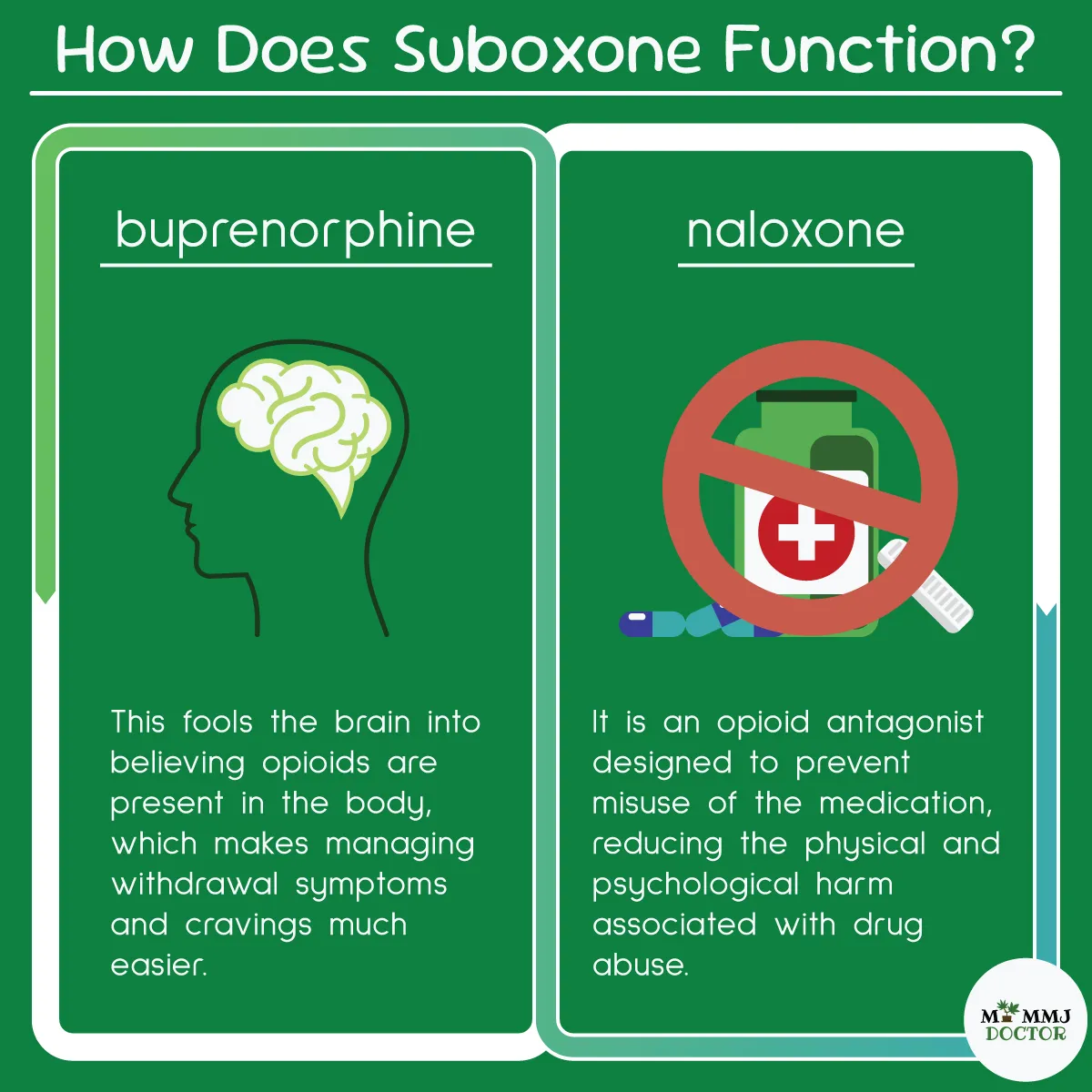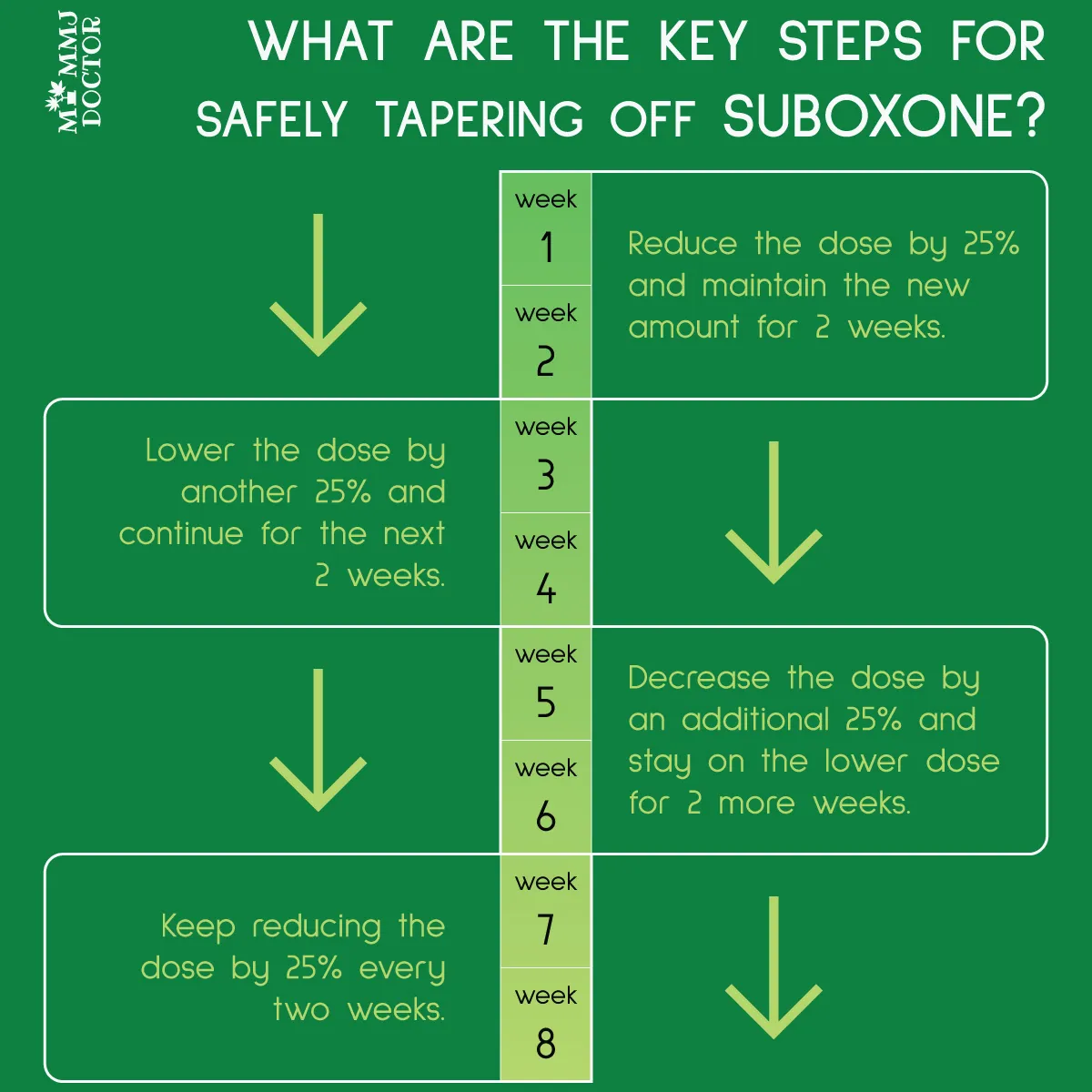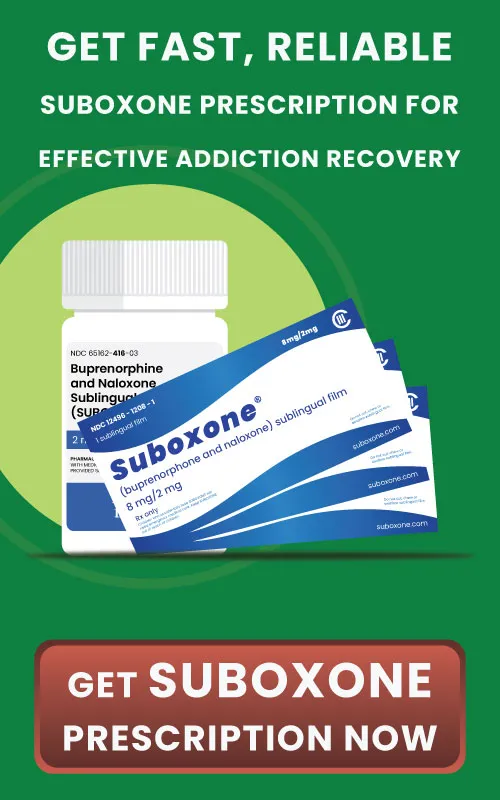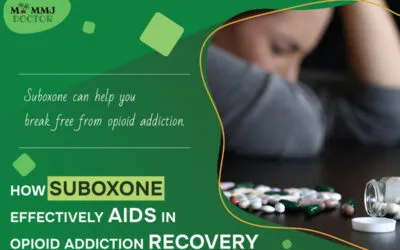How Long Should You Be on Suboxone?

Using Suboxone long-term is a safe option if it helps prevent relapse. How long you stay on the medication depends on your personal needs, preferences, goals, and any side effects you experience.
What Is Suboxone and how does Suboxone work?
Suboxone is a medication used to treat opioid addiction and contains two key ingredients: buprenorphine and naloxone. Buprenorphine helps ease withdrawal symptoms by attaching to opioid receptors in the brain, which is essential when someone stops using opioids. Opioids block a chemical called noradrenaline, leading to drowsiness and pain relief, and they release dopamine, creating feelings of pleasure.

Overall, Suboxone helps manage cravings and withdrawal, making the recovery process more manageable for those struggling with opioid addiction.
Factors That Affect How Long You May Take Suboxone?

- Severity of OUD: If you’ve used opioids for a long time or in high doses, your brain has likely undergone many changes. This may require a higher Suboxone dose and a longer treatment duration as you heal.
- Underlying Conditions: Mental health issues such as depression or anxiety can increase the risk of relapse. If you have these conditions, you might need to stay on Suboxone longer.
- Support Systems: Having supportive friends and family can make it easier to stay sober. If you have a strong support network, you can lean on them during tough times. Without this support, you may need to use Suboxone longer.
- Personal Preference: For many, Suboxone helps them return to work or school, manage family responsibilities, and build a life away from substance misuse. You might choose to stay on Suboxone indefinitely to maintain this stability.
- Side Effects: If you experience severe side effects from Suboxone or find it hard to tolerate even after your doctor adjusts your dose, you may consider switching medications or reducing your use of Suboxone.
Advantages and Considerations of Long-term Suboxone Treatment?
Benefits of Long-term Suboxone Treatment:
- Better treatment retention: Staying on Suboxone® longer helps people stick to their recovery plan and stay sober.
- Lower risk of relapse: Long-term use reduces the chances of relapsing into opioid use by managing cravings and withdrawal.
- Improved life functioning: Suboxone helps individuals improve relationships and be more productive.
- Reduced risk of overdose: People on Suboxone® for a longer time have a lower chance of opioid-related death.
Risks and Considerations:
- Withdrawal symptoms: Tapering off Suboxone® may cause withdrawal, but doctors can help manage it.
- Potential for misuse: There’s a risk of the medication being misused in the illicit market.
- Cost and access: Without insurance, Suboxone can be expensive and harder to access in rural areas.
How to Know When to Stop Suboxone Treatment?

Signs that you may need to adjust your dose, switch medications, or gradually stop include:
- Severe side effects like extreme drowsiness or nausea
- Strong opioid cravings (you might need a higher dose)
- Health issues like liver problems may not work well with Suboxone.
Best Practices for tapering off Suboxone Safely:
Suboxone takes about 36 hours for half of the dose to leave your body, so the process needs time.

Here’s a basic taper schedule:
- Weeks 1-2: Lower the dose by 25% and stick to the new amount for 2 weeks.
- Weeks 3-4: Lower the dose again by 25% and continue for 2 more weeks.
- Weeks 5-6: Cut the dose by 25% again and stay on the lower dose for another 2 weeks.
- Weeks 7-8: Keep reducing by 25% every two weeks.
Does suboxone come up on a drug test?

Conclusion
FAQs
- What is Suboxone used for?
Suboxone is mainly used to treat opioid addiction. It helps reduce withdrawal symptoms and cravings in people who are addicted to opioids.
- How long does Suboxone stay in your system?
On average, Suboxone stays in a healthy person’s system for 5 to 8 days, while for those with liver problems, it can remain for 7 to 14 days. Lab tests can still detect the drug in hair up to 30 days after the last dose.
- Can suboxone affect your blood O2 saturation level?
Yes, Suboxone (buprenorphine) can affect blood oxygen levels. In a study, 73% of patients who received buprenorphine had episodes of low oxygen levels (below 95%), similar to those who received morphine. However, people taking buprenorphine experienced more frequent episodes of low oxygen.
- Does suboxone help with pain?
Suboxone is not FDA-approved for pain relief but is sometimes used “off-label” by doctors to help manage pain. It should only be used for pain if specifically prescribed by a doctor.
- Can you overdose on suboxone?
Yes, it’s possible to overdose on Suboxone. However, when taken as prescribed by your doctor, the risk is low since buprenorphine has a limit on its effects, and naloxone helps prevent misuse.
- How does Suboxone make you feel?
Suboxone can help you feel normal by reducing cravings and withdrawal symptoms if you’re treating opioid addiction. Some people may feel drowsy or experience mild euphoria, but it’s generally not as intense as with other opioids.
- Can you get high on Suboxone?
It is possible to feel some euphoria with Suboxone, but its effects are limited due to the ceiling effect of buprenorphine. This means that taking more doesn’t increase the “high” after a certain point, making misuse less likely.
- Can you take Suboxone while pregnant?
Yes, Suboxone can be taken during pregnancy, but only under a doctor’s supervision. It helps manage opioid addiction safely, as stopping suddenly can harm both the mother and baby. Always follow medical advice.
Related Articles
How Suboxone Works in Opioid Treatment?
How Suboxone Works in Opioid Treatment?Beating an addiction can be tough, especially when withdrawal symptoms make staying sober harder. Fortunately, Suboxone is a medication that can help ease these symptoms, allowing you to focus on...
How to Get Suboxone?
How to Get Suboxone?Opioid use disorder (OUD) is a public health issue that affects millions of individuals and their families. As the crisis gets worse, good treatment options are important for helping people take control of their lives. One...
What is Suboxone?
What is Suboxone? Uses, Dosage and MisconceptionsAddiction is a serious condition that changes people's life both personally and professionally. Not only that but also changes how the brain works, making it hard for people to stop using...





0 Comments